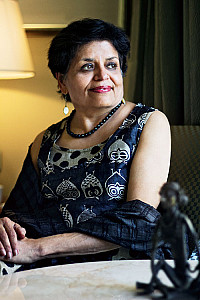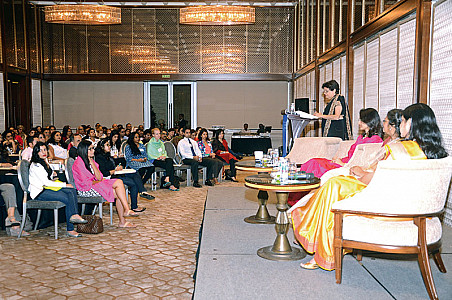“Lead differently!”
There is a renewed, and one might venture to say, welcome focus on an issue that has been discussed for many a decade, not just in India but globally as well – how can women in leadership roles play out their parts effectively and effect change in their workplace and society at large. So, one morning, I eagerly keep my appointment with a woman who has flown in from New York to Mumbai to be a vital part of discussions on this ongoing concern, looking forward to hearing her opinions honed by years of global experience. Dr Vishakha N Desai is a former president and chief executive of the New York-based Asia Society and is currently Special Advisor for Global Affairs, Office of the President, even as she serves as Professor of Professional Practice at the School of International and Public Affairs in the Columbia University, New York.
This morning, she is clad in an attractive black salwar kurta, which I learn during the course of our conversation that she has picked up in Pondicherry. We exchange ideas on a subject that is close to her and many of our hearts. As Dr Desai opines, “The conversation isn’t just about empowerment; it asks what empowered women do for the lesser privileged and their younger colleagues in society? Having said that, I think the issue of women leaders, whether it’s in India or America, is not yet complete – this is amply proved by the numerous conversations on the subject on a multitude of platforms. The reality is that this issue still is an evolving one – and perhaps, more than in women, today, we need a second revolution in men.”
Dr Desai has successfully donned the mantle of a leader, and I ask her if the decades have shown a change in the way women leaders are accepted – and what is the difference in the way women leaders are perceived in India and the States. She emphasises, “In India it is a fairly complex and layered situation as far as the perception of women is concerned. We have a Durga on the one hand and a Sita on the other. The idea of women as leaders and powerful people is acceptable as long as they are from the right class and caste. In India, in professional classes, women are definitely more accepted because they come from a certain educated class. Also, let me point out that here when we declared 33 per cent absolute representation in panchayats, the second time around women were no longer just seen as the wives, daughters and sisters of the men in their lives, but as individuals who were making a difference. Women can actually show a very different kind of leadership, for they have a better sense of what collective leadership is.”
Dr Desai has led – and does believe in leading – from the front. She underlines, “Women are savvier with regards to relational form of leadership – we are more sensitive to ups and downs so have a 3600 view of leadership. Secondly, because we are better mediators, we are able to deal with a diversity of opinions. In the globalised world that we live in today, when there is a diversity of opinions, there is a premium on negotiating differences. The flipside is that people usually say that women are lesser risk-takers than men. I think the idea of risk-taking may be a little over-hyped; in fact, there is something about being somewhat cautious. I do not want to be defined as a risk-taker, but do I have out-of-the-box thinking? Absolutely! I would say that I’m just a little more careful; I look at the context more and I think women leaders tend to do that more as well.”
Having lived in USA for 40 years, in fact, most of her adult life, Dr Desai has sensed the changing pulse of its ethos. She says, “There is a much greater awareness of women as leaders in multiple sectors. In political sectors actually, the percentage of women senators and congress women is much higher than it used to be. Also, certain businesses are much more open to women leaders. But there is still this notion that if a woman is strong the B-word is used, but if a guy is strong, he is decisive and powerful. That is why I think it is not easy to change social attitudes and we have to continue to work on that. It is also becoming apparent that the younger generation of women when they assume leadership roles no longer feel that it is an issue, but when they have children they realise that the problems are still the same. Old issues keep on coming up.”
This is where a changing mindset in men – rather than women – can help iron out a host of problems. Dr Desai rightly emphasises, “The more men get involved in child rearing and realise that this is important, the more things will change. In India, growth is very hierarchical. Not just the husbands but also the parents-in-law have to accept the changes. Interestingly, when Indian women enter the workforce they are as ambitious if not more so than American women. But, the minute they have their first child, the pressure is enormous to drop out. But, then a few years later, they want to come back. We have to still figure out the off-ramp, on-ramp situation.”
As a leader, she has faced several issues – due to her gender and her nationality. When she was spearheading the Asia Society, she says, “Initially, I actually got a huge amount of benefit by being an Indian in a field that was about Asian art as there was some authenticity that stemmed from my background in relation to my work. When I was made president of the Asian Society, my mother, a freedom fighter, told me, “If your father was alive, he would tell you that this is not about power, it’s about responsibility. So don’t think how good your position is but think about what you are going to do with it and how you are going to bring about change.” I realised and accepted later that because I’m a woman, an Indian-American, I will be a different president. I want to make a difference due to the way I am. So I began to say that make a difference because you are a woman leader; you will lead differently and it’s okay!”
Confessing that she revels in her multiplicity of identities (one of which is being a girl from Ahmedabad who lives in New York) – and each of them is contextually determined – Dr Desai looks at the changing equation between India, her birthplace, and USA, the country that is now her home. She believes, “The visit of the PM was a huge boost. The strategic combination of when he spoke…whom he spoke to was absolutely brilliant and it suggested that India now has a charismatic leader who people have elected. The whole idea of democracy was positioned high, as also the fact that he is a decisive leader who is committed to making India count.”
And what about the fact that she is a Gujarati living in New York? She smiles, “Some people might feel things have changed, but I have never been in an exclusively Gujarati circle. The only advantage I have is that when I see the PM I can talk to him in Gujarati and he feels very happy about that. He is a national leader, and I look at him thus, not as a provincial leader.”
She emphasises an important factor that could enable women leaders to effect change: “Make the boys and men responsible. Don’t always ask what your daughter is doing; ask what your son is doing. We have an obligation to teach our boys to have a different attitude. And that would bring about a revolution in society.”
Women and Change
In the Indian scenario, there continues to be a contradiction in the way women are perceived and the roles they play in different sections of society. While there is a strong and highly visible female leadership in the public and private sectors, it is combined with low rates of female participation in the formal economy, women’s vulnerability to violence and poor indicators of female health.
To take a look at some of the distinctive features of the Indian context that enable or hinder women from rising to the upper echelons of power, The Columbia Global Centres|South Asia, Columbia Alumni Association (CAA), and the Columbia Alumni Association of India (CAAI), in partnership with the university initiative, ‘Women Creating Change’, held a thought-provoking conversation led by a panel of women leaders and Columbia alumni from different sectors. Moderated by Dr Vishakha Desai, the panel had Anjali Bansal, Managing Director, Spencer Stuart, Sheela Patel, Director, Society for the Promotion of Area Resource Centres (SPARC) and Falguni Nayar, Founder and CEO Nykaa.com. Rajashree Birla, businesswoman and philanthropist graced the occasion and said a few words – emphasising how as a company they have always looked out for the interests of women.
Kick-starting from Indra Nooyi’s comment that women can’t have it all, the panellists spoke from their own experience – of the years that have shaped them into the successful leaders they are today. Birla said, “Society recognises the tremendous potential of women. So, there has to be a sensitisation of managers in the workplace to their issues – we should have policies that encourage women to continue working.”
The infrastructure at home and work plays a major role in determining the realisation of a woman’s potential. Patel pointed out, “I was married into a traditional family. But the roles I took on did not diminish me, and my work transformed me.” Nayar emphasised, “I was treated equal to the boys in the family. My opinion mattered. And my father was very protective of my need to work.”
Bansal opined, “It is often a question of identity – who am I? I was lucky that both my ‘birth’ family and my ‘marriage’ family did not define me by my gender. My choices were not dictated by stereotypes. I applied filters and made positive choices… and ultimately, if you are happy with yourself you can do better in a multiplicity of roles.”
Related posts from Verve:
Verve Trending
Sorry. No data so far.
us on Facebook to stay updated with the latest trends







